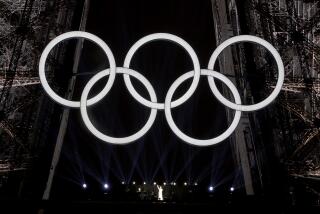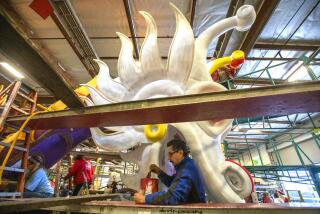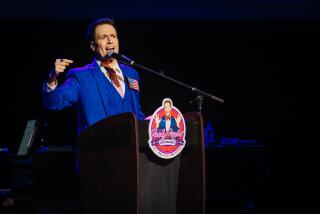It’s a Long Road to Head of Rose Parade
Gary DiSano didn’t think anything was unusual when the outgoing president of the Tournament of Roses invited him to San Marino for a casual dinner.
The invitation, the president explained, was merely social, a way of thanking DiSano for his hard work as volunteer in charge of selecting floats for the 2002 Rose Parade.
When DiSano arrived at the president’s San Marino home on a chilly Monday evening in January, he was led into the basement. As the president mixed DiSano a gin and tonic, other members of the tournament’s executive committee appeared out of the den’s dimly lighted corners.
“Welcome!” they shouted, taking turns shaking DiSano’s hand.
In that moment, a stunned DiSano realized a long-held dream--and instantly felt a new weight on his shoulders. The handshakes meant that the general manager of a Montebello automobile wheel and rim company would be president of the world’s most famous parade.
The catch?
He won’t take office for eight years.
DiSano, 55, has embarked on what one Tournament of Roses member calls the longest apprenticeship in America. During a period of study as long as that required of surgeons, DiSano will coordinate every facet of staging the Rose Parade and Rose Bowl game, from negotiating TV contracts to supervising the delivery of portable toilets--even, according to parade lore, earning the power to control the weather.
He will have one day of reward. On Jan. 1, 2010, DiSano will don the traditional red coat of president and ride down Colorado Boulevard. As president, he will give the parade his personal stamp, picking the theme, the grand marshal, the first float, maybe even one of the bands.
“Of course, there’s a big if,” says DiSano, his mood suddenly turning somber, as he uses a cane to slowly walk around the desk in his company office. “I don’t know if I’ll live that long.”
Lifelong Dedication
Friends say DiSano lives for the parade.
Growing up in Los Angeles in such neighborhoods as Lincoln Heights and Leimert Park, he often watched the Jan. 1 spectacle. In 1972, as a recently discharged lieutenant who served in Vietnam, he found himself living in Arcadia, lonely and bored. His girlfriend had left him while he was in the service; his next-door neighbor, a Tournament of Roses member, offered to nominate him for membership in the organization.
Since then, DiSano has had two careers--one as a tournament member, the other working in the family business. Frequently, the two overlap. He married a German woman who worked at one of the companies; their three children sometimes accompany him to parade functions.
Before agreeing to sell Century Wheel & Rim to an out-of-state corporation a few years back, DiSano, who continues as general manager, made sure the 20 hours a week he sometimes puts into the tournament would be OK with the prospective buyers. Century’s headquarters are decorated with mementos from his 30 years as a tournament member.
“A commitment like this is always a balancing act,” DiSano says.
From the moment a new volunteer joins (and pays a $45 annual membership fee), the tournament insists on learning by doing and decades of dues-paying. DiSano spent his first six years as a member providing muscle for the three “street committees,” which line up the floats and bands, run parade operations and oversee post-parade events.
These are thankless jobs, usually requiring volunteers to stay up all night New Year’s Eve on the streets of Pasadena. In his first year, manning a traffic barricade, DiSano was nearly run over by a speeding newspaper delivery truck. One year, he cleaned up horse droppings.
After their first six years, the tournament’s members are assigned for two-year terms on the organization’s 31 other committees. DiSano served on committees that fete special guests on New Year’s Day, inspect the construction of floats, choose parade bands, oversee public relations staff, and choose the Rose queen and her court.
Each committee has a chairperson. Promotions to chairmanships are based, like other promotions, on grades from above. Every tournament member is graded annually on his or her work in each parade.
“ ‘Apprenticeship’ is a good word for how all this works,” says Dave Davis, the treasurer.
The highest rung of the tournament is the 14-member executive committee. Five of those members are chosen at large from among all 935 tournament members, a recent innovation designed to give the committee more youth and diversity. One of the 14 is the immediate past president. The remaining eight are the princes of the tournament--all standing in the line of succession to the presidency.
Slowly Moving Up
After each parade, each of the eight moves one rung--and a year closer--to the presidency. And each January, the executive committee adds a tournament member to the line of succession. Myriad rules and traditions govern advancement, but the most talked about limitation is age. Tournament of Roses members must retire at 65, meaning that a member--to be president--must be appointed into the line of succession before his or her 57th birthday.
Once appointed into the line, a member takes the title of vice president and assumes a different set of oversight responsibilities for each of the next seven years.
A first-year president-in-training coordinates committees on the Rose Bowl kickoff luncheon, media credentials, and properties, such as those portable toilets. By the fifth year, the prospective president is tournament secretary. In the seventh year, he or she is executive vice president, with broad operational responsibilities for the parade and football game.
By the eighth year, they have overseen every committee in the tournament.
“The Rose Parade is something like the circus--you have to join it and know and learn it over years and years,” says Vice President CL Keedy, who will ride down Colorado Boulevard as president on Jan. 1, 2008.
The slow pace of succession is accompanied by a variety of traditions. There is a private dinner every Dec. 31 with Kodak, a longtime parade sponsor. There is a weekend getaway, early in the year, often to a golf resort somewhere in Southern California.
Executive committee members meet at a long table in assigned seats; members move one seat up the table each year until they reach the head in their presidential year. On New Year’s Day, the committee members take seats along the first aisle in the grandstand at Colorado Boulevard; they move one row down each year until they “reach the street” as president.
According to tradition, the executive vice president--the officer just below president--is referred to as “the Weatherman.” Each year, the departing executive VP hands a weather radio and an umbrella wrapped in fading Christmas paper to his immediate successor. The umbrella has never been unwrapped, symbolizing the executive VP’s duty to prevent any rain on the parade.
“I just have to make sure it won’t rain, that’s all,” says Mike Riffey, the current executive VP. “The way you do that is with a positive attitude.”
Once an executive vice president has proved capable of stopping the rain, the presidential year awaits. It is very much a reward.
In an organization run by tradition and committee, the tournament president is the one official who can make decisions on his own. There are perks--the tournament pays for a trip for the president anywhere in the world. Much of the president’s work also involves travel, as he visits every single band involved in the parade to help raise money for their trips to Pasadena.
Most presidents begin plotting their parade years ahead of time. Riffey has already picked his theme (he won’t say what it is and has told only the attorney who registers the trademark) and organized a trip to China and Tibet. “It’s a long haul,” says Riffey. “You can’t help but think ahead.”
It’s such a long haul that three executive committee members never finished their apprenticeship--most recently in 1993. They died before they could ride down Colorado Boulevard.
“The only thing that ends the apprenticeship,” says DiSano, “is death.”
Unlikely Candidate
DiSano says he never thought he would end up in the line of succession. He long ago relocated to Newport Beach. Most tournament members live in Pasadena or surrounding cities.
“And I’m not a member of the Valley Hunt or Annandale,” a reference to two clubs dominated by the rich or well-connected of the San Gabriel Valley.
But the line of succession has recently undergone democratization, at least by the standards of the tournament. There are no minorities in line, but there is a woman, Libby Evans Wright, who will go down Colorado in 2006. The eight people currently in the line of succession include small-time bankers, a retired hospital executive, an assistant facilities manager, and the owner of the Hat, a pastrami chain. There’s only one certified blueblood in the bunch.
DiSano impressed tournament executives with his chairmanship of the committee overseeing floats. Last year, he supervised a post-Sept. 11 remaking of many of the floats with patriotic themes. What only a few friends in the tournament knew was that, even as he ran what many see as the parade’s most important committee, DiSano was battling cancer.
He was diagnosed with Hurthle cell carcinoma, a rare form of thyroid cancer, in December 1999. In February 2000, he had his thyroid and his hip removed. The cancer does not respond to chemotherapy, so DiSano began an aggressive therapy that used massive doses of vitamin A to literally change his cells.
All during the therapy, he never took leave of his tournament duties, even though his children--Christina, 15, Stephanie, 13, and Dominic, 9--worried and his wife, Sabina, “told me I was nuts.”
“I think the parade work kept him going,” says Riffey, who knew of the illness. “If Gary had not had the tournament to turn to, Gary might not be here today.”
The executive committee votes on whom to invite into its ranks, although the entire membership must ratify those choices.
When the committee picked DiSano, the immediate past president, Ron Okum, called DiSano with the seemingly innocuous invitation to dinner at Okum’s home.
“I was surprised and embarrassed when the executive committee showed up in Ron’s basement,” says DiSano. DiSano now says he has wondered whether he wasn’t chosen in part because of his illness. While his treatment is progressing well, 85% of people with his type of thyroid cancer die within five years. Given the eight-year lead time, “I guess you could say I’m an interesting choice,” he says.
On the night he was chosen, executive committee members took DiSano to dinner at the Ritz-Carlton. Perpetuating a new tradition, tournament Vice President Corky Conzonire, who will officiate the 2009 parade, gave DiSano a tie that had once belonged to Delmer Beckhart. Beckhart died in June 1993, six months before he would have presided over the 1994 parade.
“Fantastic Adventure,” the tie says, reflecting Beckhart’s chosen theme and the long apprenticeship ahead.


